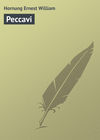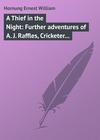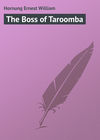Buch lesen: «Tiny Luttrell», Seite 4
CHAPTER IV.
RUTH AND CHRISTINA
Here is the difference between Ruth and Christina, who were considered so much alike.
Of the two, Ruth was the one to fall in love with at sight – of which Erskine Holland supplies the proof. She was less diminutive than her sister; she had a finer figure, a warmer color, and indeed, despite the destructive Australian sun, a very beautiful complexion. In the early days at Wallandoon she had given herself a better chance in this respect than Christina had done, not from vanity at all, but rather owing to certain differences in their ideas of pleasure, into which it is needless to enter. The result was her complexion; and this was not her only beauty, for she had good brown eyes that suited her coloring as autumn leaves befit an autumn sunset. These eyes are never unkind, but Ruth's were sweet-tempered to a fault. So the glance of one scanning both girls for the first time rested naturally upon Ruth, but on all subsequent occasions it flew straight to Christina, because there was an end to Ruth; but there was no coming to an end of Tiny, about whom there was ever some fresh thing to charm or disappoint one.
Thus, but for the businesslike dispatch of Erskine Holland, it might have been Ruth's fate to break in Christina's admirers until Christina fancied one of them enough to marry him. For Ruth's was perhaps the more unselfish character of the two, as it was certainly the simpler one, in spite of a peculiar secretive strain in her from which Tiny was free. Tiny, on the other hand, was much more sensitive; but to perceive this was to understand her better than she understood herself. For she did not know her own weaknesses as the self-examining know theirs, and hardly anybody suspected her of this one until her arrival in England – when Erskine Holland came to treat her as a sister, and to understand her more or less.
In Australia he had seen very little of her, though enough to regard her at the time as an arrant little heartless flirt, for whom sighed silly swains innumerable. That she was, indeed, a flirt there was still no denying; but as his knowledge of her ripened, Holland was glad to unharness the opprobrious epithets with which Ruth's sister had first driven herself into his mind. He discovered good points in Christina, and among them a humor which he had never detected out in Australia. Probably his own sense of it had lost its edge out there, for love-making blunts nothing sooner; while Ruth, for her part, was naturally wanting in humor. Holland had never been blind to this defect in his wife, but he seemed resigned to it; one can conceive it to be a merit in the wife of an amusing man.
Some people called Erskine amusing – it is not hard to win this label from some people – but at any rate he was never likely to find it difficult to amuse Ruth. Now no companion in this world is more charming for all time than the person who is content to do the laughing. As a novelty, however, Christina had her own distinctive attraction for Erskine Holland. And they got on so well together that presently he saw more in Tiny than her humor, which others had seen before him; he saw that her heart was softer than she thought; but he divined that something had happened to harden it.
"She has been falling in love," he said to Ruth – "and something has happened."
"What makes you think so? She has told me nothing about it," Ruth said.
"Ah, she is sensitive. I can see that, too. It's her bitterness, however, that makes me think something has turned out badly."
"She is sadly cynical," remarked Ruth.
"Cynically sad, I rather think," her husband said. "I don't fancy she's languishing now; I should say she has got over the thing, whatever it has been – and is rather disappointed with herself for getting over it so easily. She has hinted at nothing, but she has a trick of generalizing; and she affects to think that one person doesn't fret for another longer than a week in real life. I don't say her cynicism is so much affectation; something or other has left a bad taste in her mouth; but I should like to bet that it wasn't an affair of the most serious sort."
"Her affairs never were very serious, Erskine."
"So I gathered from what I saw of her before we were married. It's a pity," said Erskine musingly. "I'd like to see her married, but I'd love to see her wooed! That's where the sport would come in. There would be no knowing where the fellow had her. He might hook her by luck, but he'd have to play her like fun before he landed her! There'd be a strong sporting interest in the whole thing, and that's what one likes."
"It's a pity I didn't know what you liked," Ruth said, with a smile; "and a wonder that you liked me, and not Tiny!"
"My darling," laughed her husband, "that sort of sport's for the young fellows. I'm past it. I merely meant that I should like to see the sport. No, Tiny's charming in her way, but God forbid that it should be your way too!"
Now Ruth was such a fond little wife that at this speech she became too much gratified on her own account to care to discuss her sister any further. But in dismissing the subject of Tiny she took occasion to impress one fact upon Erskine:
"You may be right, dear, and something may have happened since I left home; but I can only tell you that Tiny hasn't breathed a single word about it to me."
And this is an early sample of the disingenuous streak that was in the very grain of Ruth. Christina, indeed, had told her nothing, but Ruth knew nearly all that there was to know of the affair whose traces were plain to her husband's insight. Beyond the fact that the name of Tiny Luttrell had been coupled in Melbourne with that of Lord Manister, and the on dit that Lord Manister had treated her rather badly, there was, indeed, very little to be known. But Ruth knew at least as much as her mother, who had written to her on the subject the more freely and frequently because her younger daughter flatly refused the poor lady her confidence. There was no harm in Ruth's not showing those letters to her husband. There was no harm in her keeping her sister's private affairs from her husband's knowledge. There was the reverse of harm in both reservations, as Erskine would have been the first to allow. Ruth had her reasons for making them; and if her reasons embodied a deep design, there was no harm in that either, for surely it is permissible to plot and scheme for the happiness of another. I can see no harm in her conduct from any point of view. But it was certainly disingenuous, and it entailed an insincere attitude toward two people, which in itself was not admirable. And those two were her nearest. However amiable her plans might be, they made it impossible for Ruth to be perfectly sincere with her husband on one subject, which was bad enough. But with Christina it was still more impossible to be at all candid; and this happened to be worse, for reasons which will be recognized later. In the first place, Tiny immediately discovered Ruth's insincerity, and even her plans. Tiny was a difficult person to deceive. She detected the insincerity in a single conversation with Ruth on the afternoon following Lady Almeric's ball, and before she went to bed she was as much in possession of the plans as if Ruth had told her them.
The conversation took place in Erskine's study, where the sisters had foregathered for a lazy afternoon.
"Oh, by the way," said Ruth, apropos of the ball, "it was a coincidence your dancing with Lord Manister."
"Why a coincidence?" asked Christina. She glanced rather sharply at Ruth as she put the question.
"Well, it is just possible that we shall see something of him in the country. That's all," said Ruth, as she bent over the novel of which she was cutting the pages.
Christina also had a book in her lap, but she had not opened it; she was trying to read Ruth's averted face.
"I thought perhaps you meant because we saw something of him in Melbourne," she said presently. "I suppose you know that we did see something of him? He even honored us once or twice."
"So you told me in your letters."
The paper knife was still at work.
"What makes it likely that we shall see him in the country?"
"Well, Mundham Hall is quite close to Essingham, you know."
"Mundham Hall! Whose place is that?"
"Lord Dromard's," replied Ruth, still intent upon her work.
"Surely not!" exclaimed Christina. "Lord Manister once told me the name of their place, and I am convinced it wasn't that."
"They have several places. But until quite lately they have lived mostly at the other side of the county, at Wreford Abbey."
"That was the name."
"But they have sold that place," said Ruth, "and last autumn Lord Dromard bought Mundham; it was empty when we were at Essingham last year."
For some moments there was silence, broken only by the leisurely swish of Ruth's paper knife. Then Christina said, "That accounts for it," thinking aloud.
"For what?" asked Ruth rather nervously.
"Lord Manister told me he knew of Essingham. He never mentioned Mundham. Is it so very close to your rectory?"
"The grounds are; they are very big; the hall itself is miles from the gates – almost as far as our home station was from the boundary fence."
"Surely not," Tiny said quietly.
"Well, that's a little exaggeration, of course."
"Then I wish it wasn't!" Tiny cried out. "I don't relish the idea of living under the lee of such very fine people," she said next moment, as quietly as before.
"No more do I – no more does Erskine," Ruth made haste to declare. "But we enjoyed ourselves so much there last August that we said at the time that we would take the rectory again this August. We made the people promise us the refusal. And it seemed absurd to refuse just because Lord Dromard had bought Mundham; shouldn't you have said so yourself, dear?"
"Certainly I should," answered Tiny; and for half an hour no more was said.
The afternoon was wet; there was no inducement to go out, even with the necessary energy, and the two young women, on whose pillows the sun had lain before their faces, felt anything but energetic. The afternoon was also cold to Australian blood, and a fire had been lighted in Erskine's den. His favorite armchair contained several cushions and Christina – who might as well have worn his boots – while Ruth, having cut all the leaves of her volume, curled herself up on the sofa with an obvious intention. She was good at cutting the leaves of a new book, but still better at going to sleep over them when cut. She had read even less than Christina, and it troubled her less; but this afternoon she read more. Ruth could not sleep. No more could Tiny. But Tiny had not opened her book. It was one of the good books that Erskine had lent her. She was extremely interested in it; but just at present her own affairs interested her more. Lying back in the big chair, with the wet gray light behind her, and that of the fire playing fitfully over her face, Christina committed what was as yet an unusual weakness for her, by giving way voluntarily to her thoughts. She was in the habit of thinking as little as possible, because so many of her thoughts were depressing company, and beyond all things she disliked being depressed. This afternoon she was less depressed than indignant. The firelight showed her forehead strung with furrows. From time to time she turned her eyes to the sofa, as if to make sure that Ruth was still awake, and as often as they rested there they gleamed. At last she spoke Ruth's name.
"Well?" said Ruth. "I thought you were asleep; you have never stirred."
"I'm not sleepy, thanks; and, if you don't mind, I should like to speak to you before you drop off yourself."
Ruth closed her novel.
"What is it, dear? I'm listening."
"When you wrote and invited me over you mentioned Essingham as one of the attractions. Now why couldn't you tell me the Dromards would be our neighbors there?"
Ruth raised her eyes from the younger girl's face to the rain-spattered window. Tiny's tone was cold, but not so cold as Tiny's searching glance. This made Ruth uncomfortable. It did not incapacitate her, however.
"The Dromards!" she exclaimed rather well. "Had they taken the place then?"
"You say they bought it before Christmas; it was after Christmas that you first wrote and expressly invited me."
"Was it? Well, my dear, I suppose I never thought of them; that's all. They aren't the only nice people thereabouts."
"I'm afraid you are not quite frank with me," the young girl said; and her own frankness was a little painful.
"Tiny, dear, what a thing to say! What does it mean?"
Ruth employed for these words the injured tone.
"It means that you know as well as I do, Ruth, that it isn't pleasant for me to meet Lord Manister."
"Was there something between you in Melbourne?" asked Ruth. "I must say that nobody would have thought so from seeing you together last night. And – and how was I to think so, when you have never told me anything about it?"
Christina laughed bitterly.
"When you have made a fool of yourself you don't go out of your way to talk about it, even to your own people. It is kind of you to pretend to know nothing about it – I am sure you mean it kindly; but I'm still surer that you have been told all there was to tell concerning Lord Manister and me. I don't mean by Herbert. He's close. But the mother must have written and told you something; it was only natural that she should do so."
"She did tell me a little. Herbert has told me nothing. I tried to pump him, – I think you can't wonder at that, – but he refused to speak a word on the subject. He says he hates it."
"He hates Lord Manister," said Christina, smiling. "It came round to him once that Lord Manister had called him a larrikin, and he has never forgiven him. But he has been less of a larrikin ever since. And, of course, that wasn't why he was so angry with me for dancing with Lord Manister last night; he was dreadfully angry with me as we drove home; but he is a very good boy to me, and there was something in what he said."
"What made you dance with him?" Ruth said curiously.
"I was alone. I hadn't a partner. He asked me rather prettily – he always had pretty manners. You wouldn't have had me show him I cared, by snubbing him, would you?"
"No," said Ruth thoughtfully; and suddenly she slipped from the sofa, and was kneeling on the hearthrug, with her brown eyes softly searching Christina's face and her lips whispering, "Do you care, Tiny? Do you care, Tiny, dear?"
Tiny snapped her fingers as she pushed back her chair.
"Not that much for anybody – much less for Lord Manister, and least of all for myself! Now don't you be too good to me, Ruth; if you are you'll only make me feel ungrateful, and I shall run away, because I'm not going to tell you another word about what's over and done with. I can't! I have got over the whole thing, but it has been a sickener. It makes me sick to think about it. I don't want ever to speak of it again."
"I understand," said Ruth; but there was disappointment in her look and tone, and she added, "I should like to have heard the truth, though; and no one can tell it me but you."
"I thank Heaven for that!" cried Christina piously. "The version out there was that he proposed to me and I accepted him, and then he bolted without even saying good-by. It's true that he didn't say good-by; the rest is not true. But you must just make it do."
Her face was scarlet with the shame of it all; but there was no sign of weakness in the curling lips. She spoke bitterly, but not at all sadly, and her next words were still more suggestive of a wound to the vanity rather than to the heart.
"Does Erskine know?"
"Not a word."
"Honestly?"
"Quite honestly; at least I have never mentioned it to him, and I don't think anybody else has, or he would have mentioned it to me."
"Oh, Herbert wouldn't say anything. Herbert's very close. But – don't you two tell each other everything, Ruth?"
The young girl looked incredulous; the married woman smiled.
"Hardly everything, you know! Erskine has lots of relations himself, for instance, and I'm sure he wouldn't care to tell me the ins and outs of their private affairs, even if I cared to know them. It's just the same about you and your affairs, don't you see."
"Except that he knows me so well," Christina reflected aloud, with her eyes upon the fire. "If I had a husband," she added impulsively, "I should like to tell him every mortal thing, whether I wanted to or not! And I should like not to want to, but to be made. But that's because I should like above all things to be bossed!"
"You would take some bossing," suggested Ruth.
"That's the worst of it," said Christina, with a little sigh, and then a laugh, as she snatched her eyes from the fire. "But I can't tell you how glad I am you haven't told Erskine. Never tell him, Ruth, for you don't know how I covet his good opinion. I like him, you know, dear, and I rather think he likes me – so far."
"Indeed he does," cried Ruth warmly; and a good point in her character stood out through the genuine words. "Nothing ever made me happier than to see you become such friends."
"He laughs at me a good deal," Tiny remarked doubtfully.
"That's because you amuse him a good deal. I can't get him to laugh at me, my dear."
"He would laugh," said Christina, with her eyes on the fire again, "if you told him I had aspired to Lord Manister!"
"But I'm not going to tell him anything at all about it." Ruth paused. "And after all, the Dromards won't take any notice of us in the country." She paused again. "And we won't speak of this any more, Tiny, if you don't like."
The shame had come back to Christina's face as she bent it toward the fire. Twice she had made no answer to what was kindly meant and even kindlier said. But now she turned and kissed Ruth, saying, "Thank you, dear. I am afraid I don't like. But you have been awfully good and sweet about it – as I shan't forget." And the fire lit their faces as they met, but the tear that had got upon Tiny's cheek was not her own.
Ruth, you see, could be tender and sympathetic and genuine enough. But she could not be sensible and let well alone.
She did that night a very foolish thing: she brought up the subject again. Tempted she certainly was. Never since her arrival in England had Tiny seemed so near to her or she to Tiny as in the hours immediately following the chat between them in Erskine's study. But Christina stood further from Ruth than Ruth imagined; she had not advanced, but retreated, before the glow of Ruth's sympathy. This was after the event, when some hours separated Christina from those emotional moments to which she had not contributed her share of the emotion, leaving the scene upon her mind in just perspective. She still could value Ruth's sweetness at the end of their talk, but her own suspicions, aroused at the outset, to be immediately killed by a little kindness, had come to life again, and were calling for an equal appreciation. The extent of Tiny's suspicions was very full, and the suspicions themselves were uncommonly shrewd and convincing. They made it a little hard to return Ruth's smiles during the evening, and to kiss her when saying good-night, though Tiny did these things duly. She went upstairs before her time, however, and not at all in the mood to be bothered any further about Lord Manister. Yet she behaved very patiently when Ruth came presently to her room and thus bothered her, being suddenly tempted beyond her strength. For Christina was discovered standing fully dressed under the gas-bracket, and frowning at a certain photograph on an orange-colored mount, which she turned face downward as Ruth entered. Whereupon Ruth, discerning the sign manual of a Melbourne photographer, could not help saying slyly, "Who is it, Tiny?"
"A friend of mine," Tiny said, also slyly, but keeping the photograph itself turned provokingly to the floor.
"In Australia?"
"Er – it was taken out there."
"It's Lord Manister!"
"Perhaps it is – perhaps it isn't."
"Tiny," said Ruth with pathos, "you might show me!"
But Tiny drummed vexatiously on the wrong side of the mount; and here Ruth surely should have let the matter drop, instead of which:
"You are very horrid," she said, "but I must just tell you something. I have heard things from Lady Almeric, who is very intimate with Lady Dromard, and I don't believe he is so much to blame as you think him. I have heard it spoken about in society. But don't look frightened. Your name has never been mentioned. I don't think it has ever come out. Indeed, I know it hasn't, for I, actually, have been asked the name of the girl Lord Manister was fond of in Melbourne – by Lady Almeric!"
"And what did you say?"
"What do you suppose? I glory in that fib – I am honestly proud of it. But, dear, the point is, not that Lord Manister has never mentioned your name, but that he can bear neither name nor sight of the girl he is expected to marry! Lady Almeric told me when – I couldn't help her."
"He is a nice young man, I must say!" remarked Christina grimly. "My fellow-victim has a title, no doubt?"
"Well, it's Miss Garth, and her father's Lord Acklam, so she's the honorable," said Ruth gravely. (Tiny smiled at her gravity.) "But I've seen her, and – he can't like her! And oh! Tiny dear, they all say he left his heart in Australia, but his mother sent for him because she heard something – but not your name, dear – and he came. They say he is devoted to his mother; but this has come between them, and she's sorry she interfered, because after all he won't marry poor Miss Garth. I had it direct from Lady Almeric when she tried to get that out of me. But I lied like a trooper!" exclaimed poor Ruth.
"I'm grateful to you for that," Christina said, not ungraciously – "but I must really be going to bed."
With a last wistful glance at the orange-colored cardboard, Ruth took the hint. Christina turned away in time to avoid an embrace without showing her repugnance, because she had still some regard for Ruth's good heart. But she had never experienced a more grateful riddance, and the look that followed Ruth to the threshold would have kept her company for some time had she turned there and caught one glimpse of it.
"Now I understand!" said Christina to the closed door. "I suppose I ought to love you for it, Ruth; but I don't – no, I don't!"
She turned the photograph face upward, and stared thoughtfully at it for some minutes longer; then she put it away.




















